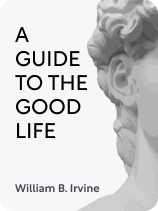

This article is an excerpt from the Shortform book guide to "A Guide to the Good Life" by William B. Irvine. Shortform has the world's best summaries and analyses of books you should be reading.
Like this article? Sign up for a free trial here.
Do you worry about getting hurt? Is it possible to train yourself to hurt less?
In A Guide to the Good Life, William B. Irvine argues that the ancient Greek and Roman philosophy of Stoicism has answers for many of today’s challenges. He describes six techniques that promise happiness through counterintuitive methods, including deliberately exposing yourself to discomfort.
Read more to learn about the practice of Stoic voluntary discomfort and see how it can help you handle what life throws at you.
Stoic Voluntary Discomfort
One way to avoid clinging to wealth and status is to deliberately seek out discomfort. Doing so builds up your tolerance for unpleasant experiences and makes them less of a big deal for you. Irvine notes that this Stoic voluntary discomfort can be physical or emotional. For example, you could choose not to use your car’s air conditioner on a hot summer day, or you could volunteer to give a presentation even though you fear public speaking. If you follow this practice regularly, Irvine says, you’ll worry less about bad things that might befall you in the future because you’ll already know you can handle any situation.
(Shortform note: This practice is similar to what modern psychology calls exposure therapy—a technique whereby a therapist helps a patient confront a feared object (such as spiders) or situation (such as large crowds) in a controlled manner. The difference is that Irvine’s practice doesn’t target a specific fear—rather, it targets discomfort in general. Experts propose several theories for why exposure works, arguing that repeated experiences may reduce the intensity of our reactions or build our confidence that we can cope with the object or situation. Whatever the exact mechanism, research supports Irvine’s claim that intentionally undergoing negative experiences can decrease worry and anxiety.)
Another way you can practice voluntary discomfort is to willingly forgo pleasure. According to Irvine, pleasure is addictive—but whenever you pass it up, you weaken its grasp on you and instead increase your self-control. In doing so, you learn that you don’t have to follow your desires, and you free yourself from any dependency on wealth, status, and luxury.
(Shortform note: In passing up pleasure, the goal isn’t to make yourself miserable through deprivation—it’s to realize that you can be happy under any circumstances, whether pleasant, unpleasant, or neutral. That’s because skipping pleasures helps you understand the difference between pleasure and happiness and the fact that pleasure doesn’t make us happy. In The Art of Happiness, the Dalai Lama clarifies this distinction further by defining happiness as a lasting state of non-suffering (what Irvine calls tranquility) that persists in the presence or absence of pleasures, which only offer short-term enjoyment.)

———End of Preview———
Like what you just read? Read the rest of the world's best book summary and analysis of William B. Irvine's "A Guide to the Good Life" at Shortform.
Here's what you'll find in our full A Guide to the Good Life summary:
- A simple step-by-step guide to developing a Stoic practice
- How to be happier, calmer, and more fulfilled in life
- How you can evaluate your Stoic progress daily






